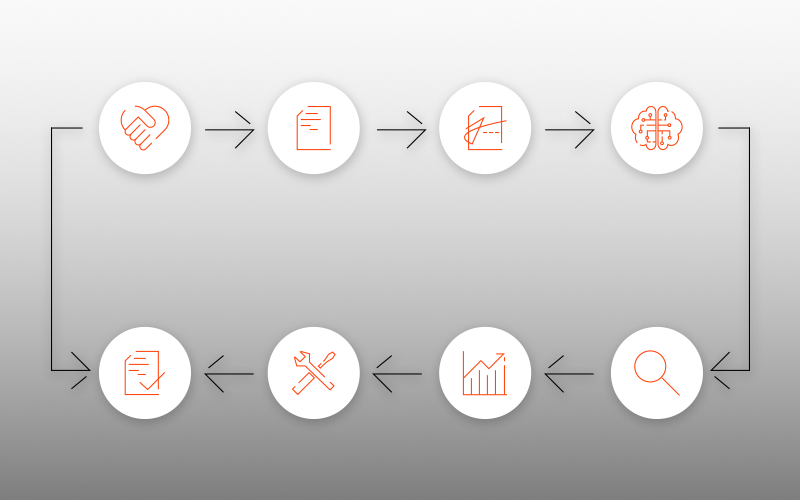As the world around us rapidly changes, how is the contract workflow adapting along with it — and what role do contract outsourcing and contract automation play in this new landscape?
To find out, Ontra commissioned Wakefield Research to collect and analyze data from a targeted, in-the-know audience. This independent survey encompassed 1,000 business and legal professionals from the US, UK, Hong Kong, and Singapore in roles related to managing routine contracts.
Our purpose with the survey was clear: understand how enterprises manage routine legal contracts to identify gaps, trends, and opportunities in contract workflows.
Here are 10 things to know about contract management:
1. Routine contract work is on the rise.
People are busier than ever on routine contract work. Per the survey, 71% of respondents said their routine contract work increased over the last six months — with 21% saying it “increased significantly.”
The reasons for this rise in work? Respondents cited increased business growth (63%), increased M&A activity (46%), reorganization of supply chains (45%), and reduced headcount from COVID-19 (37%). It all adds up to many late nights and early mornings spent on routine contract work. Is your organization feeling the crunch?
2. Regulatory restrictions and the lack of accountability across departments are the biggest concerns with routine contracts.
What causes the bottleneck when it comes to routine contracts? At the top of the list are a lack of accountability across departments (35%) and critical regulatory restrictions (35%), followed by a lack of visibility into the responsibilities for specific tasks (34%) and the lack of a systemic approach (33%).
One thing that’s clear? There’s no shortage of challenges. Respondents cited everything from clunky homegrown systems to trouble managing Word and PDF documents.
3. Excessive routine contract work takes a toll on morale.
All that routine contract work does a number on company spirit. In the survey, 64% of respondents said routine contract work can hurt employee morale, with 18% saying the work “hurts morale significantly.”
This mind-numbing work can have a real impact on employee turnover, especially in the era of “The Great Resignation.” Discouraging (and overwhelming) routine contract work could quickly drive valuable employees to seek greener pastures.
4. Outsourcing or automating routine legal work is becoming more common.
Keeping routine legal work in-house is anything but normal these days. In fact, of the respondents surveyed, only 24% said their company has not outsourced or automated any routine contract management processes.
The bottom line? With the bulk of the industry moving ahead with outsourcing or automating the hassle of routine legal work, those insourcing routine contract work risk falling far behind.
5. Security and cost are the top concerns for outsourcing or automating contract management.
The big reasons organizations hold back on outsourcing or automating? Understandably, security concerns (40%) and cost (38%) were at the top of the list. Organizations need to prioritize clients’ privacy, ensure the safety of their data, and address other obligations while watching their budgets — a hard balance to strike without the right contract management system.
6. Contract outsourcing and automation can speed up negotiations.
Lengthy, drawn-out negotiations can be deadly. They soak up time, resources, effort, and patience for all parties involved. The good news? Companies recognize automation or outsourcing can help cut down on these delays.
Among companies that have not entirely outsourced or automated their contract management processes, 79% said their negotiations would go faster with these advancements. In today’s business landscape, this edge can make for a key differentiator among competitors.
7. Organizations see the potential of outsourcing or automation.
Even companies that have not outsourced or automated routine contracts see the potential of both. In the survey, 92% of those companies reported it would benefit them if more of their contract management processes were automated or outsourced.
What resource would they use? Well, over half (54%) said they’d choose a legal technology provider while 42% would use an alternative legal services provider (ALSP).
8. Companies plan to increase their outsourcing or automating investments.
The level of buy-in for outsourcing or automation in the legal industry is skyrocketing. Nearly 80% of companies plan on increasing their spending in 2022, while only 2% said they’d decrease their investment in outsourcing or automation. Of those increasing their spending, 65% will invest in additional technology and tools.
What does your outsourcing or automation strategy look like over the next year?
9. Outsourcing or automating routine legal contracts frees up a ton of time.
According to the survey, companies that automate or outsource their contract management processes find themselves with more time to spend on other high-value matters. In fact, 65% of those companies stated they save anywhere from 4 to over 10 hours a week through these methods.
What sort of engaging, high-impact work could your team get done with all the time and resources freed up from outsourcing or automating routine legal contracts?
10. Contract outsourcing and automation practices are overwhelmingly beneficial.
The final insight from the survey? Companies that engage with contract outsourcing and automation are overwhelmingly happy with the results. The survey showed 94% of companies consider contract outsourcing and automation beneficial to their bottom line.
Read the full Wakefield survey here.








